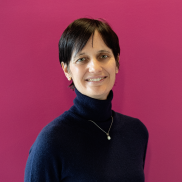Presentation
Michela Deleidi graduated from Vita-Salute University, San Raffaele Scientific Institute, Milan, Italy. She completed her residency in neurology followed by a research fellowship at the Neuroregeneration Institute at Harvard Medical School, Boston, USA. During this time, she focused on pluripotent stem cell technology for Parkinson's disease (PD) modeling and regenerative medicine applications. She was awarded an Alexander von Humboldt Fellowship and moved to Germany to complete her PhD studies at the German Center for Neurodegenerative Diseases (DZNE) in Tübingen. By combining cellular reprogramming with genome editing, her work led to one of the first stem cell-based models of Parkinson's disease, clearly demonstrating a mechanistic link to lysosomal storage diseases. Since 2016, Michela Deleidi has been a Helmholtz Young Investigator at the DZNE and Assistant Professor of Neurology at the University of Tübingen. In January 2023, she moved to France where she currently heads the "Mechanisms and Therapy of Genetic Brain Diseases" team at the Imagine Institute. The research vision of her group is to study how discrete genetic factors contribute to neurological disorders, with a particular interest in the mechanistic links between rare inherited diseases and age-related neurodegenerative diseases. Her team is currently pursuing the following lines of research: 1) mechanistic links between rare monogenic diseases (mitochondrial and lysosomal storage disorders) and complex age-related brain disorders (Alzheimer's and Parkinson's disease); 2) links between seemingly unrelated diseases such as inflammatory bowel disease, infections, and Parkinson's disease. Her team is developing models using induced pluripotent stem cells and long-term organoid cultures combined with single-cell analysis.

